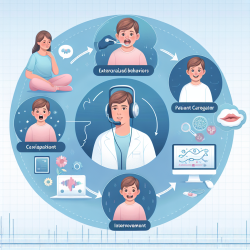In the realm of speech-language pathology, the ability to make data-driven decisions is paramount to achieving optimal outcomes for children. A recent study titled Longitudinal trajectories of peer relations in children with specific language impairment provides crucial insights that can guide practitioners in refining their therapeutic approaches. This study, conducted over nine years, reveals distinct developmental trajectories of peer relations among children with specific language impairment (SLI) and highlights key factors that influence these trajectories.
According to the research, four developmental trajectories were identified among children with SLI:
- Low-level/no problems in peer relations (22.2%)
- Childhood-limited problems (12.3%)
- Childhood-onset persistent problems (39.2%)
- Adolescent-onset problems (26.3%)
One of the critical findings is that children with pragmatic language difficulties are at a higher risk of experiencing persistent peer problems. Specifically, children with childhood-onset persistent problems had 2.5 times higher odds of having pragmatic language difficulties at age 7 compared to those with low/no peer problems. This emphasizes the importance of early identification and intervention for pragmatic language impairments.
Moreover, the study underscores the role of prosocial behavior as a protective factor. Children who exhibited higher levels of prosocial behavior had better peer relations. This finding suggests that interventions aimed at enhancing prosocial behaviors could significantly improve social outcomes for children with SLI.
To implement these insights in practice, consider the following strategies:
1. Early Identification and Intervention
Screen children for pragmatic language difficulties early on. Implement targeted interventions to address these difficulties, which may include social communication skills training and pragmatic language therapy.
2. Promoting Prosocial Behaviors
Incorporate activities and programs that foster prosocial behaviors, such as cooperative games, group projects, and social skills training. Encourage parents and teachers to model and reinforce prosocial behaviors at home and in school.
3. Addressing Emotional Symptoms
Monitor and support children’s emotional well-being. Provide counseling or emotional support services as needed to help children manage emotional symptoms that could negatively impact their peer relations.
4. Collaborative Approach
Work closely with parents, teachers, and other professionals to create a supportive environment for children with SLI. Collaborative efforts can ensure that interventions are consistent and reinforced across different settings.
For practitioners, staying informed about the latest research and incorporating evidence-based strategies into practice is crucial. The findings from this study provide a robust foundation for improving peer relations and overall social outcomes for children with SLI.
To read the original research paper, please follow this link: Longitudinal trajectories of peer relations in children with specific language impairment.










